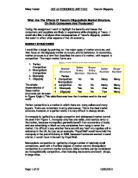Discuss the effectiveness of government use of maximum and minimum prices to help consumers and producers. [12]
Discuss the effectiveness of government use of maximum and minimum prices to help consumers and producers. [12]
The terms maximum and minimum prices refers to a type of price control implemented by governments where the price of a given good is now allowed to either go above a certain value, as in the case of maximum prices, or below a certain value, as in the case of minimum prices. In order for such measures to be considered “effective”, they must be either below the equilibrium price, in the case of maximum price, or above the market price, in the case of minimum prices. If this condition is not met, the price control will have no impact on the market.
Maximum prices are usually implemented in order to help consumers. They are most often imposed on necessity goods in order to improve access to the good, as, by having its price lowered, more people are able to afford to buy the good, leading more people being able to from the consumption of the good. Moreover, this type of price control would also help lead to a fall in the cost of living which would then lead to an increase in the purchasing power of consumers, thus leading to an increase in the demand for other goods and services. On the one hand, this increase in purchasing power would lead to an improvement in the standards of living due to the fact that more needs and services can be consumed, and, on the other hand, it would also lead to an improvement in the long term growth prospects for the country due to the higher demand for other goods and services, eventually causing an extension in the supply for said goods and services, as such allowing for higher quantities to be traded and thus a higher GDP.



![Discuss the effectiveness of government use of maximum and minimum prices to help consumers and producers. [12]](https://mbt-essays-prod-public.s3.eu-west-1.amazonaws.com/1216963/listing/1216963_1.jpg)

![Discuss whether payment of government subsidies to farmers is a beneficial policy [12]](https://mbt-essays-prod-public.s3.eu-west-1.amazonaws.com/1216973/listing/1216973_1.jpg)

![Discuss whether it is better to introduce an indirect tax or to adopt policies to improve consumers knowledge and understand to deal with the problem of demerit goods. [12]](https://mbt-essays-prod-public.s3.eu-west-1.amazonaws.com/1216967/listing/1216967_1.jpg)
